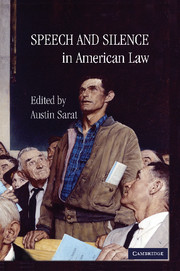Book contents
- Frontmatter
- Contents
- Contributors
- Acknowledgments
- Introduction: Situating Speech and Silence
- 1 “Our Word Is Our Bond”
- 2 Powell's Choice: The Law and Morality of Speech, Silence, and Resignation by High Government Officials
- 3 Anonymous: On Silence and the Public Sphere
- 4 Freedom of Expression, Political Fraud, and the Dilemma of Anonymity
- 5 Speech, Silence, the Body
- Index
- References
5 - Speech, Silence, the Body
Published online by Cambridge University Press: 04 August 2010
- Frontmatter
- Contents
- Contributors
- Acknowledgments
- Introduction: Situating Speech and Silence
- 1 “Our Word Is Our Bond”
- 2 Powell's Choice: The Law and Morality of Speech, Silence, and Resignation by High Government Officials
- 3 Anonymous: On Silence and the Public Sphere
- 4 Freedom of Expression, Political Fraud, and the Dilemma of Anonymity
- 5 Speech, Silence, the Body
- Index
- References
Summary
On December 8, 2008, Khalid Sheikh Mohammed told Colonel Stephen Henley, presiding at his military tribunal, that he and four companions intended to “announce our confessions to plea in full”: enter a plea of guilty to all charges, and to demand that they be executed. They were of course making a claim to both religious and political martyrdom – and putting the tribunal in a bind between punishment and the creation of martyrs to the enemy cause. But for all that, their six years of imprisonment at Guantánamo might make even less fanatical prisoners wish to cop a plea that simply put an end to everything. I was reminded of the ancient words of Maimonides, explaining why the Halakah forbids confessions from the accused suspect:
It is a scriptural decree that the court shall not put a man to death or flog him on his own admission [of guilt]…. For it is possible that he was confused in mind when he made the confession. Perhaps he was one of those who are in misery, bitter in soul, who long for death, [who] thrust the sword into their bellies or cast themselves down from the roofs. Perhaps this was the reason that prompted him to confess to a crime he had not committed, in order that he be put to death. To sum up the matter, the principle that no man is to be declared guilty on his own admission is a divine decree.
- Type
- Chapter
- Information
- Speech and Silence in American Law , pp. 190 - 213Publisher: Cambridge University PressPrint publication year: 2010



